Your Guide to Buying Properties in Sicily
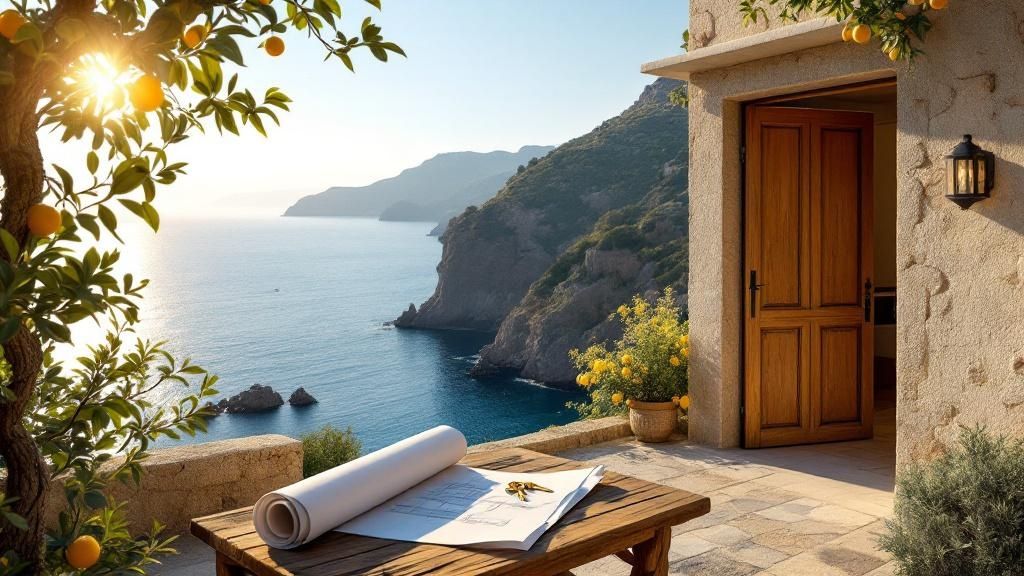
Imagine waking up to sun-drenched landscapes, ancient history, and the aroma of authentic cuisine. That's the Sicilian lifestyle, and owning a piece of it is far more achievable than most people realize. I’m going to walk you through everything, from understanding the local market to the final handshake, so you can move forward feeling confident and fully prepared.
Your Sicilian Property Dream Starts Now
Let's turn that dream of owning property in Sicily into a clear, actionable plan. Right here, we'll break down why this Mediterranean island is such a unique place to buy real estate, offering a rare blend of affordability, rich culture, and genuine investment potential. Think of this as your personal roadmap to securing your own slice of heaven.
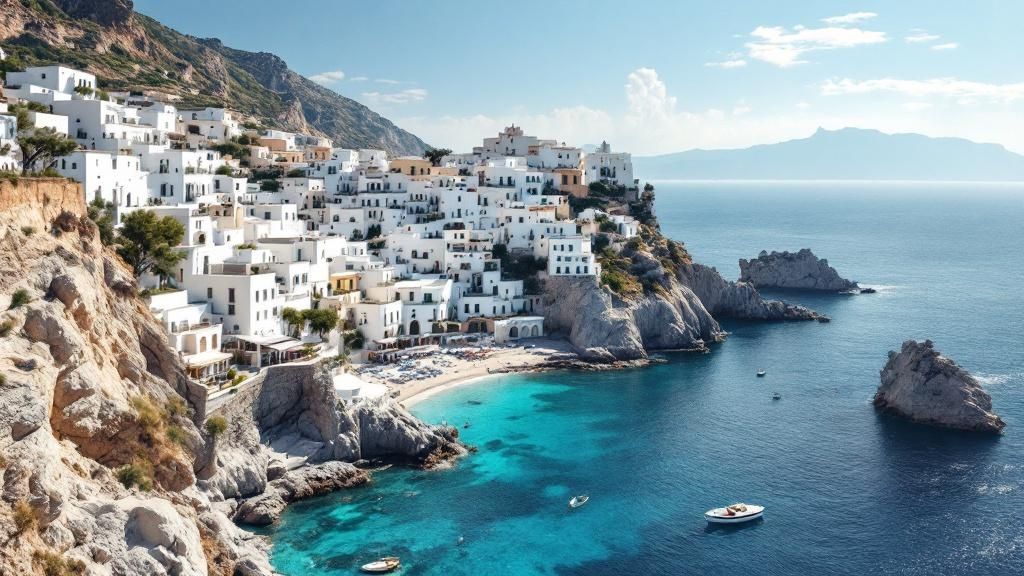
Choosing Sicily is about more than just buying a house—it's about embracing a completely different pace of life. It’s a place where ancient ruins stand next to bustling markets, and every meal feels like a small celebration. For anyone looking to buy, this creates an opportunity that’s hard to find anywhere else.
Finding Real Value in the Heart of the Mediterranean
One of the most compelling reasons people are drawn to Sicily is the incredible value for money. The island gives you a chance to get into the Italian property market at a fraction of the cost you'd find in overheated regions like Tuscany or the Amalfi Coast. This accessibility opens the door for a much wider range of buyers, from those wanting a modest holiday apartment to investors eyeing a villa with rental income potential.
The numbers tell a clear story. As of mid-2025, the average asking price for properties in Sicily is sitting between €1,162 and €1,200 per square meter. That figure is roughly 30-40% lower than the Italian national average, making the island an unbelievably competitive market. Yet, despite being so affordable, the market is showing steady annual growth between 2% and 4%, which points to a healthy, upward trend. You can find more insights on Sicily's property market to see the data for yourself.
Sicily's real estate market offers a rare combination: the allure of an iconic Italian lifestyle combined with the practical benefits of an accessible and growing investment.
So, What Makes Sicily So Appealing?
The island’s appeal really does come from all sides, attracting a diverse crowd of international buyers. It doesn't matter if you're an investor, a retiree, or a family looking for a big life change—Sicily has something to offer.
Here are a few of the key attractions for property buyers:
- A Thriving Tourism Sector: A steady stream of visitors fuels strong demand for short-term rentals. This translates into excellent rental yields, which currently average around 5%.
- Cultural and Historical Richness: From Greek temples to Baroque cathedrals, the entire island is like an open-air museum, offering a living experience that is simply second to none.
- Diverse Landscapes: You can truly choose your own adventure. Pick from vibrant coastal cities like Palermo, charming hilltop towns, or quiet rural farmhouses surrounded by ancient olive groves.
This guide will help you navigate this exciting landscape, giving you the practical tools and insider knowledge you need to make your Sicilian property dream a reality.
Decoding the Sicilian Property Market
To really get a handle on the opportunity here, you have to look past the postcard-perfect beaches and see what’s actually happening with the numbers. Buying a home in Sicily isn’t just about finding a gorgeous villa; it's about understanding how tourism and a steady stream of foreign buyers are shaping the entire real estate landscape.
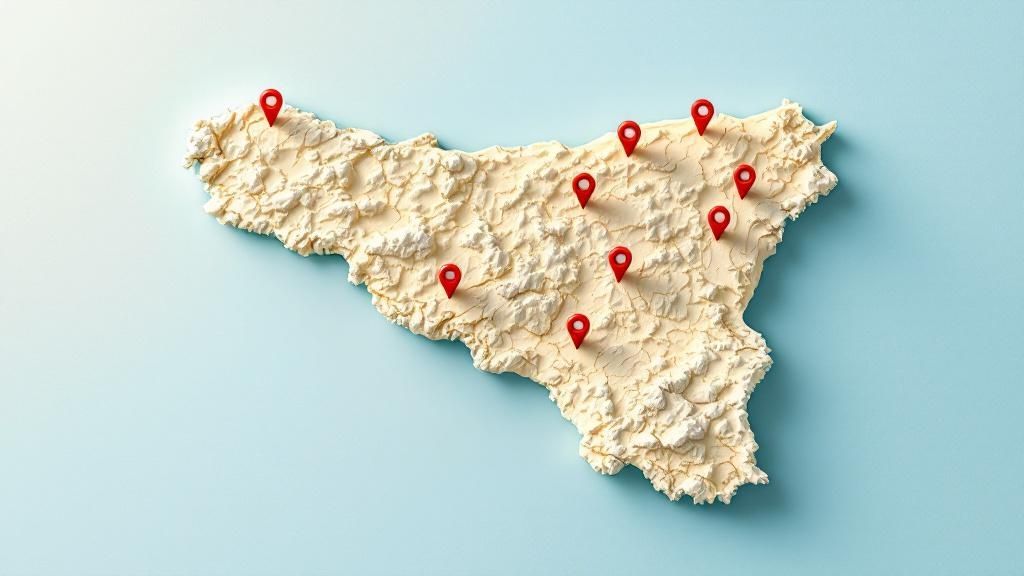
I like to think of Sicily's property market as a fantastic winery that’s finally getting the global recognition it deserves. For a long time, it was a local secret. Now, the world is waking up to its value and character, and that shift creates a really interesting dynamic for anyone looking to buy.
The Two Speeds of the Sicilian Market
One of the first things you'll notice is a big difference between property sale prices and rental income. It's a bit of a paradox. While home prices have settled into a pattern of modest, stable growth, the rental market is absolutely booming, thanks to an endless appetite from tourists. This creates a fascinating two-speed market that works well for both lifestyle buyers and sharp investors.
For instance, looking at the data up to mid-2025, property prices across Sicily grew by a very slight 0.09%. That's a huge change from the 3% jump we saw between 2023 and 2024. Right now, the average asking price is hovering around €1,200 per square meter, but that number can swing wildly depending on where you look.
This stability is great news for buyers. It means you can get into the market without paying the crazy premiums you see in other parts of Europe. At the same time, the thriving short-term rental scene gives you a clear path to generating a strong, immediate return on that investment. If you're weighing your options, our guide on the best countries to buy property can help put Sicily's unique appeal into a global context.
A Tale of Two Sicilies: How Prices Vary
The incredible diversity of the island is mirrored in its property prices. A farmhouse in a quiet, inland province will have a completely different price tag than a sea-view apartment in a tourist mecca. It’s this variation that allows buyers to find a corner of Sicily that truly fits their budget and dreams.
To give you a clearer picture, let's break down the prices across different provinces. This table shows just how much the cost can differ from one area to another.
Property Price Snapshot Across Sicilian Provinces
| Province | Average Price per m² (Sale) | Market Characteristic |
|---|---|---|
| Caltanissetta | €683 | Most affordable, primarily inland rural properties. |
| Palermo | €1,299 | Capital city premium, strong urban rental demand. |
| Messina | €1,257 | Key hub with access to the Aeolian Islands. |
| Catania | €1,172 | Major business and transport hub on the east coast. |
| Syracuse | €1,157 | Historic city with high tourist and lifestyle appeal. |
As you can see, the numbers tell a story. You can find incredible value if you know where to look, or you can invest in prime locations where demand is consistently high.
The biggest driver behind these price differences is tourism. It’s simple supply and demand. In famous towns like Cefalù, for example, properties in the historic center can easily fetch over €2,470/m²—that’s more than double the island's average. This highlights the split personality of the market: there's a Sicily for peaceful living and a Sicily for high-yield investment.
What This Means For You as a Buyer
When you understand these market forces, you can make a much smarter decision. Are you looking for a quiet escape and want your money to go as far as possible? Heading inland could uncover some incredible deals. But if your main goal is generating strong rental income, then focusing on established tourist magnets like Taormina, Syracuse, or the Aeolian Islands is a time-tested strategy.
Ultimately, the Sicilian property market offers a compelling blend of stability and opportunity. It’s mature enough to feel safe but has the growth potential of an emerging hotspot. Whether you’re dreaming of a modern city apartment, a serene coastal home, or a rustic country estate, you'll find Sicily has a place for you. By seeing these trends for what they are, you’re not just buying a house; you’re making a strategic move into one of Europe's most exciting real estate markets.
Finding Your Perfect Sicilian Location
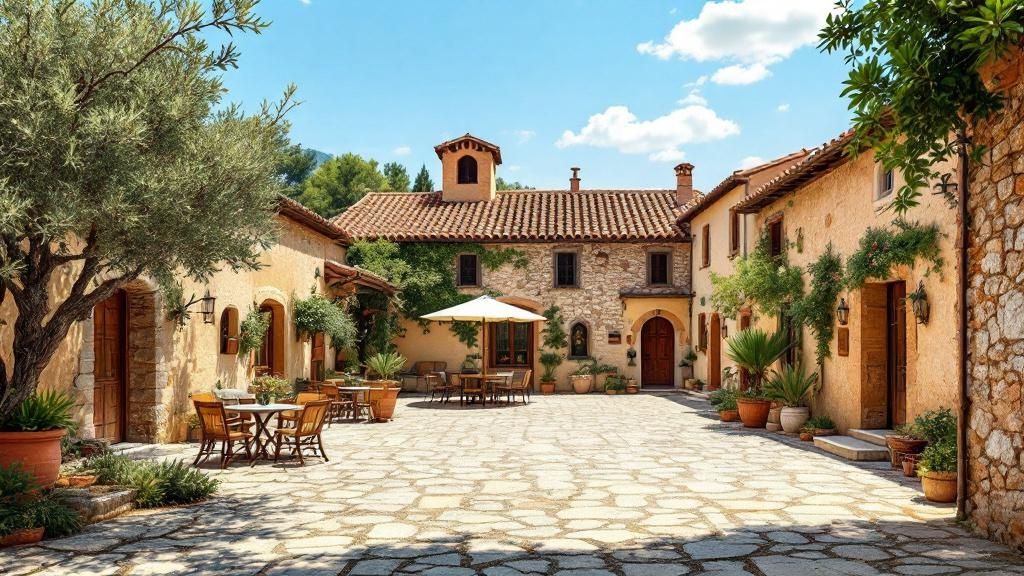 Sicily isn't a single entity. It’s a vibrant mosaic of regions, each with its own rhythm, character, and way of life. When you decide to buy properties in Sicily, the real challenge isn't just finding a house—it's discovering the corner of the island that feels like it was made just for you. It's about matching your personal dream to a specific place on the map.
Sicily isn't a single entity. It’s a vibrant mosaic of regions, each with its own rhythm, character, and way of life. When you decide to buy properties in Sicily, the real challenge isn't just finding a house—it's discovering the corner of the island that feels like it was made just for you. It's about matching your personal dream to a specific place on the map.
Think of it like choosing a bottle of wine. Are you after a bold, complex red with deep roots in history, or do you prefer a light, crisp white that’s perfect for a lazy day by the sea? Sicily offers a full cellar of choices. This isn't just a list of towns; consider it a journey through the island's soul to help you find your perfect match.
Palermo and the Vibrant North Coast
If you're drawn to raw energy, layers of history, and a touch of grand, faded glamour, Palermo is your city. As the island's capital, it's a wonderfully chaotic and utterly captivating metropolis where ancient Byzantine mosaics stand just a stone's throw from bustling street markets. Life here is lived out loud, on the streets, with passion.
Property in Palermo's historic center typically means apartments in grand old buildings—some exquisitely restored, others waiting patiently for a new owner with a vision. Head further out, and you'll find more modern residences. This is the place for anyone who wants to be at the heart of the action, with world-class culture, cuisine, and history right on their doorstep. Nearby coastal towns like Cefalù offer a stunning alternative, blending medieval charm with resort-style living, though you can expect to pay a premium for the view.
Syracuse and the Baroque Beauty of the Val di Noto
For those who dream of architectural elegance and a more refined coastal atmosphere, the southeast is a must-see. Syracuse, with its enchanting island of Ortigia, is undoubtedly the star of the show. It offers a flawless blend of Greek history, breathtaking Baroque splendor, and a chic, walkable lifestyle.
Owning a property in Ortigia is like living inside an open-air museum, where every alleyway leads to another historical treasure or a charming seaside cafe. It represents the absolute pinnacle of Sicilian historic lifestyle buying.
This whole region, which includes the UNESCO-protected towns of Noto, Modica, and Ragusa, is known as the Val di Noto. After a devastating earthquake in 1693, these towns were completely rebuilt in a magnificent, theatrical Baroque style.
- Noto: Known as the "Capital of Baroque," its honey-colored stone buildings seem to glow at sunset. It's a small, impossibly elegant city perfect for lovers of art and architecture.
- Modica: Famous for its dramatic, tiered landscape and its unique Aztec-style chocolate, this city offers a rich, layered cultural experience.
- Ragusa: A city literally split in two—the historic Ragusa Ibla and the modern Ragusa Superiore—it offers a less-traveled path into truly authentic Sicilian life.
The Exclusive Escape of the Aeolian Islands
If your vision of Sicily involves barefoot luxury, dramatic volcanic landscapes, and impossibly clear waters, the Aeolian Islands are your sanctuary. This chain of seven small islands, including the fashionable Panarea and the ever-erupting Stromboli, offers a secluded and truly exclusive escape from the mainland buzz.
Life here is dictated by the sea and the seasons. Properties are typically traditional whitewashed villas, often boasting breathtaking views and private access to the water. This is one of the most prestigious areas to buy properties in Sicily, attracting a discerning international crowd. It's a market defined by privacy, raw natural beauty, and a quiet, understated glamour.
Trapani, Marsala, and the Authentic West Coast
The western coast offers a different kind of magic—one rooted in ancient salt pans, world-famous Marsala wine, and a more rugged, authentic feel. The cities of Trapani and Marsala are historic port towns with a strong North African influence you can see in their architecture and taste in their couscous-based dishes.
This region is often more affordable than the tourist-heavy east coast, offering fantastic value for your money. Here, you can find everything from elegant apartments in Trapani's historic center to sprawling farmhouses (bagli) set amongst endless vineyards and olive groves. It's an ideal choice for buyers seeking a genuine slice of Sicilian life, away from the main tourist trails but still overflowing with culture and natural beauty.
Your Step-By-Step Guide to Buying Property in Italy
The Italian property-buying process can feel like a different world, full of unfamiliar terms and procedures. It’s easy to feel intimidated, but once you understand the key stages, you'll see it's a very logical system. Think of it less as a maze and more as a series of checkpoints, each one getting you closer to owning your own slice of Sicily.
Let's walk through it chronologically.
Your first move, before you even think about offers, is to build your A-team. You wouldn’t climb Mount Etna without a guide, and you shouldn’t navigate a foreign property market alone. Your team should include a trusted real estate agent (agente immobiliare), a surveyor (geometra), and a public notary (notaio). Each has a specific, vital role in making sure your purchase is smooth and secure.
Getting Started: The First Steps
The absolute first thing any non-Italian buyer needs is a Codice Fiscale—an Italian tax code. This is your unique ID number for all official business in Italy, from opening a bank account to, you guessed it, signing a property contract. It's a simple piece of administrative work, but nothing moves forward without it.
Once you have your Codice Fiscale and have found a place you’ve fallen for, it's time to make an offer. This isn't a handshake deal; it's a formal, written document called a proposta d’acquisto (purchase proposal). This is a legally binding offer that lays out your proposed price and any conditions, like the sale being contingent on you securing a mortgage. You'll typically back it up with a small deposit (caparra) to show you're serious.
The Purchase Journey in a Nutshell
This graphic lays out the entire process, from finding your dream home to finally getting the keys.
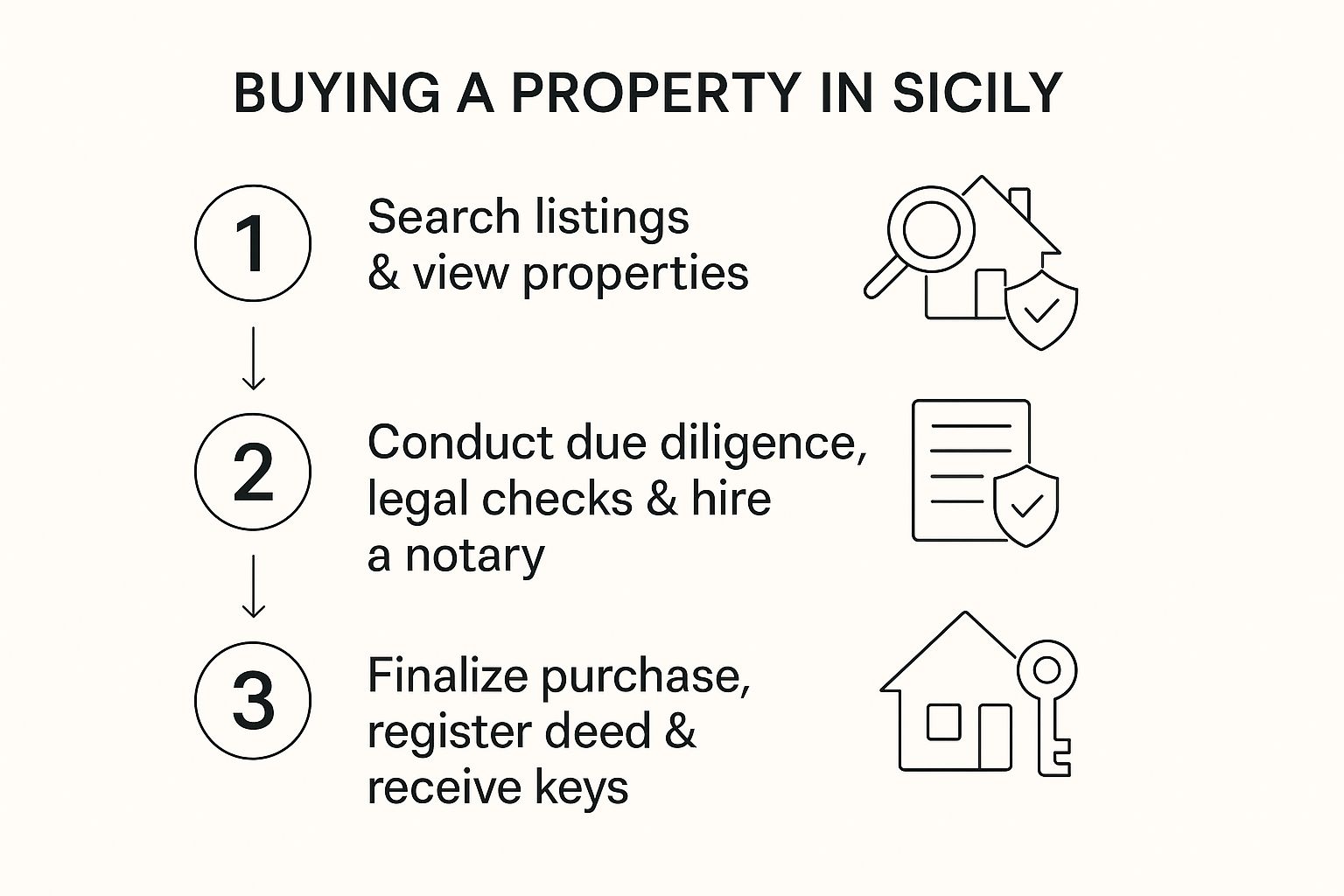
As you can see, that middle stage—due diligence and legal checks—is the linchpin for a safe investment.
The Heart of the Deal: The Compromesso
With your offer accepted, you move to the next major milestone: the preliminary contract. It’s known as the compromesso or contratto preliminare di vendita. This is where things get serious. It’s a much more detailed agreement that locks in the terms of the sale, and it’s legally binding for both you and the seller.
This is also when you'll pay a significant deposit, usually between 10% to 30% of the purchase price. The compromesso clearly states the final date for completion and should be officially registered to protect your investment. This is where your geometra (surveyor) really proves their worth, digging into all the necessary checks to make sure the property is exactly as it seems.
The due diligence phase is where you can't afford to cut corners. Your surveyor is your detective, verifying property lines, checking for any unapproved construction or building code violations, and ensuring all paperwork is in order. This step saves you from potentially massive headaches and expenses later on.
For a more granular look at the legal side of things, our full guide on buying a house in Italy breaks down these crucial stages even further.
The Final Act: The Rogito
The grand finale of your property purchase is the rogito, which is the public deed of sale. This is the official closing, and it happens at the office of the notaio (notary). A notary in Italy isn't just a lawyer; they are a public official who acts as a neutral third party, guaranteeing the legality of the transaction and ensuring all taxes are handled correctly.
During the rogito, the notary reads the entire deed out loud to make sure everyone understands and agrees. Once it's signed, you'll pay the remaining balance on the property, plus all the taxes and fees. The notary then registers the new deed with the land registry (Catasto), and just like that, you are the official owner.
The keys are handed over, and your dream of owning a home in Sicily is finally a reality.
Budgeting for Your Sicilian Property Purchase
Alright, let's talk money. Getting a firm grip on the total financial picture is the single most important step you can take toward buying a home in Sicily with confidence. It’s never just about the price on the listing—a realistic budget has to account for everything from taxes and legal fees to the possibility of getting a mortgage.
Think of it this way: the sticker price is just the starting line. A solid rule of thumb is to set aside an extra 8% to 15% of the property's purchase price to cover all the closing costs. Building in this buffer from the start means you’re ready for every expense that pops up along the way, with no nasty surprises.
Uncovering the Hidden Costs
When you buy property in Italy, a few key expenses come into play on top of the price you negotiate with the seller. These fees are standard across the country, but they can add up fast if you haven't planned for them.
Here’s a clear breakdown of the main costs to factor into your budget:
- Registration Tax (Imposta di Registro): This is a big one. For a resale property bought from a private seller, this tax is 9% of the property’s official cadastral value (which, thankfully, is often lower than the market price). The good news? If it's going to be your primary residence (prima casa), that rate drops dramatically to just 2%.
- Notary Fees (Notaio): In Italy, the notary is a neutral public official who makes the sale legally binding. Their fees are usually on a sliding scale, but expect to pay somewhere between 1% and 2.5% of the purchase price.
- Real Estate Agent Commission (Commissione): The agent’s fee is typically split between the buyer and seller. As the buyer, your share will likely be between 3% and 5% of the sale price, plus a 22% VAT on top of the commission.
- Legal Fees: While you're not legally required to hire your own lawyer, I strongly recommend it, especially for foreign buyers. An independent, bilingual lawyer is your best advocate. Budget around 1% to 2% of the purchase price for their help—it's money well spent to protect your interests.
Securing Financing as a Non-Resident
So, can you get a mortgage in Italy as a foreigner? Absolutely, but you need to be well-prepared. Italian banks are open to lending to non-residents, though they tend to be cautious. They’ll want to see proof of a stable income, a clean credit history, and a solid financial footing.
You can typically expect to get a loan for up to 60% of the property’s appraised value. That means you’ll need to come up with a down payment of at least 40% in cash. Be ready to provide a mountain of paperwork, from tax returns and bank statements to proof of employment. My advice? Start the conversation with banks as early as possible.
The ability for foreigners to get mortgages is more than just a convenience—it's a powerful signal of the market's underlying health. Lenders see the strong rental demand in Sicily, making it an attractive proposition for both cash buyers and those who need financing.
This investment appeal is backed by solid numbers. Rental prices for properties in Sicily have shown incredibly strong, above-average growth. By June 2025, the average asking rent hit €7.97 per square meter per month. That's a 6.41% jump from the previous year, showing just how much tourism continues to fuel a thriving rental economy. You can dig into more detailed data on Sicily's rental and sales market on immobiliare.it.
If you’re ready to get into the nitty-gritty of the buying process, our full guide on how to buy property in Italy breaks down every financial and legal step in even more detail.
Alright, let's get into the nitty-gritty. Buying a property anywhere is a big deal, but when you're doing it in Sicily, there are a few local quirks and pro tips that can make the difference between a good purchase and a truly fantastic one. Think of this as the advice you'd get over a coffee from a friend who's already been through it all—the stuff that saves you time, money, and a whole lot of headaches.
First up, let's talk about negotiating. In Sicily, it's less of a battle and more of a dance. While sellers absolutely expect you to negotiate, coming in with an aggressive, lowball offer is a quick way to get the door shut in your face. It’s often seen as disrespectful. A polite offer that's around 5-10% below the asking price is a much better starting point.
The real aim isn't to "win" by getting the lowest possible price, but to find a number that feels fair to everyone. When you build a bit of rapport with the seller, the whole process tends to go smoother, and they're often more flexible on things like closing dates or leaving behind a few pieces of furniture.
Assemble Your Local Dream Team
If there's one piece of advice to take away, it's this: you can't do this alone. You need a solid team of local experts on your side. Your real estate agent is just the start; there are two other people you absolutely must have in your corner when buying properties in Sicily.
First, find a great bilingual lawyer who has zero connection to the seller or the real estate agency. Their only job is to protect you. They’ll pour over every single document, from the initial offer (proposta d'acquisto) to the final deed (rogito), making sure there are no hidden clauses or nasty surprises. Don't even think about skipping this step.
Second, you need a geometra, which is a type of technical surveyor. Get them involved early. A geometra is essentially your property detective, tasked with digging up any dirt before you sign on the dotted line.
- Verifying Permits: The geometra will check that every bit of the house, including any additions or renovations, was built with the proper permits. Discovering unapproved work after you buy can turn into a legal and financial nightmare.
- Confirming Boundaries: They'll make sure the property lines on the official documents match the actual fences and walls on the ground. This simple check can prevent years of arguments with your future neighbors.
- Inspecting for Structural Issues: They perform a detailed survey to spot any structural problems—the kind of things you’d never see with an untrained eye.
Smart Strategies for Finding the Right Property
To find a real gem, you have to start thinking like a local. One of my favorite tips is to visit your top-choice areas in the off-season. Go in November or February. This is when the tourist crowds are gone, and you can see what a town is really like. You'll discover which cafes stay open, how quiet the streets are, and get a genuine feel for the community's rhythm.
When you're looking at a property's potential, especially if you plan to rent it out, don't get hypnotized by the sea view. Think practically. How close is it to the local bakery, the market, and a good café? Is parking a nightmare? Can you get around easily without a car? These are the everyday details that make a place truly liveable and will make your property stand out to renters and feel like home to you.
Common Questions About Buying Property in Sicily
As you get closer to turning your Sicilian dream into a reality, you're bound to have questions. It’s only natural. To give you some clarity, we’ve pulled together the most common queries we get from prospective buyers. Think of this as a quick, no-nonsense FAQ to help clear up any lingering uncertainties.
Can Foreigners Buy Property in Sicily Without Restrictions?
For the most part, yes. The process is surprisingly open. If you're an EU citizen, you have the exact same property rights as any Italian. It's that simple. For non-EU citizens—that includes folks from the US, UK, Canada, and Australia—a 'reciprocity' principle generally means you can buy property without any major hurdles.
The one non-negotiable for everyone, no matter where you're from, is getting an Italian tax code. It's called a Codice Fiscale. Don't worry, it's a simple administrative task, but it is absolutely essential. Nothing moves forward without it.
What Are the Main Taxes After I Buy a Home?
Once you have the keys, your main annual property tax is the IMU (Imposta Municipale Unica). The fantastic news here is that if the property is your primary residence (prima casa), you're usually exempt from paying it, unless it's officially designated as a luxury home.
For second homes or holiday properties, however, the IMU is mandatory. The rate is decided by the local municipality (comune), so it can differ from town to town. Every property owner also has to pay TARI, the local waste collection tax, which is calculated based on your property's size.
Think of the prima casa tax break as a warm welcome from the Italian government. It’s a real incentive for people to make Sicily their permanent home, underlining the island’s open arms to new residents.
Should I Buy a Modern Home or One Needing Renovation?
Ah, the classic dilemma. This really boils down to your budget, your timeline, and just how much of a project you’re willing to take on.
- A modern, move-in-ready home is all about convenience. You can start enjoying la dolce vita from day one, but you'll definitely pay a premium for it.
- A property needing a full renovation (da ristrutturare) often comes with a much more attractive price tag. It's a blank slate to create something truly yours. The catch? You have to be realistic about renovation costs, navigate the permit process, and manage local contractors—which is a tall order if you don't have local contacts or speak the language.
How Important Is Speaking Italian When Buying Property?
You can certainly get through the buying process without being fluent, especially in the more tourist-heavy areas. But knowing at least some basic Italian will make your life infinitely easier. It smooths out everything from negotiating with a seller to setting up your utility bills.
If your Italian isn't up to scratch, hiring a bilingual lawyer, real estate agent, and translator isn't a luxury—it's a crucial part of the investment. This team is your safety net, ensuring you understand every document and every conversation, protecting you and your purchase every step of the way.
Ready to explore the stunning properties Sicily has to offer? At Residaro, we connect you with an extensive portfolio of villas, apartments, and country homes across the island. Find your dream home in Sicily by visiting us at https://residaro.com.